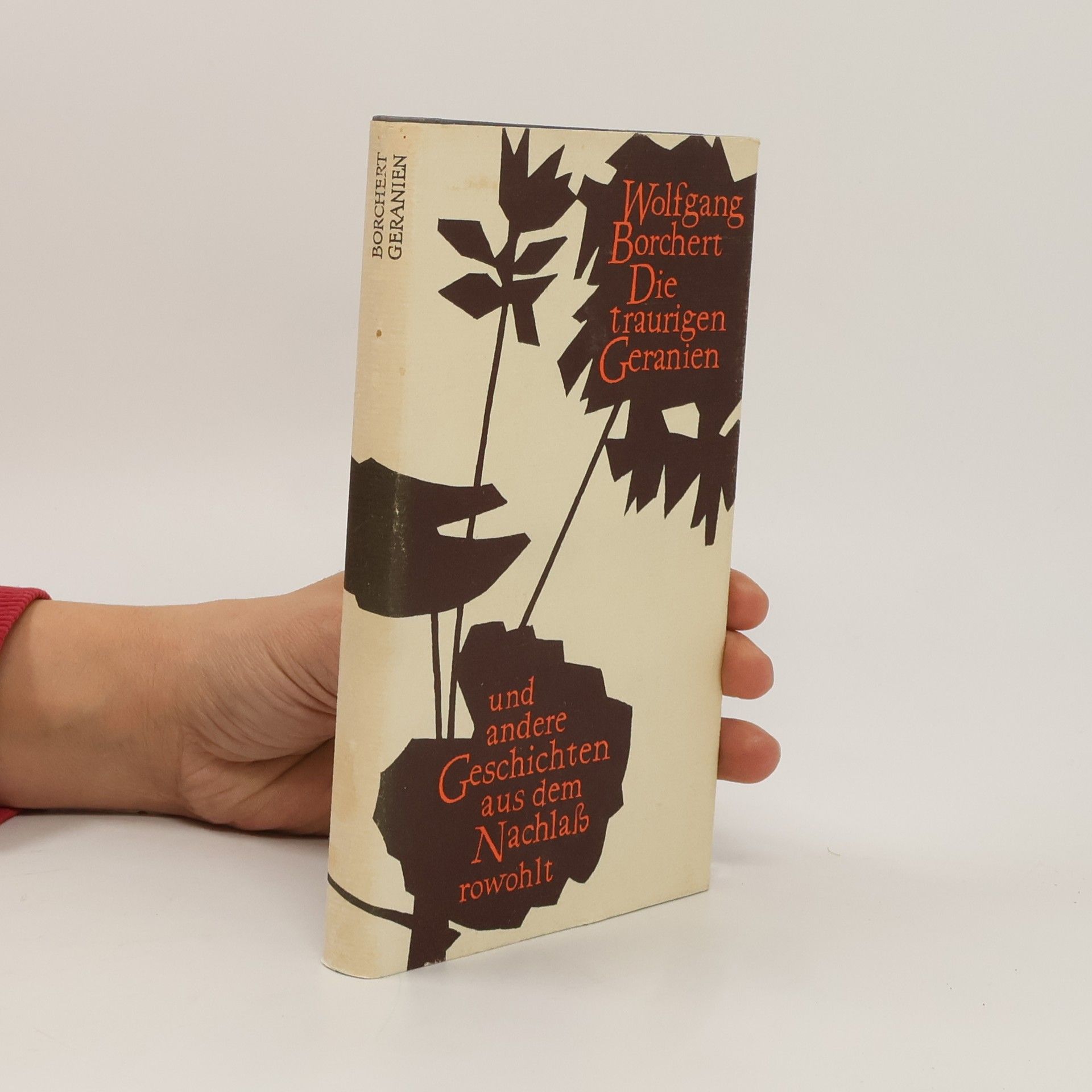Das Buch bietet einen Einblick in die Themen und Inhalte, die ursprünglich von Walde + Graf in Berlin veröffentlicht wurden. Es behandelt spezifische Aspekte, die für die damalige Zeit oder die behandelten Themen relevant sind. Der historische Kontext und die einzigartigen Perspektiven machen es zu einer interessanten Lektüre für Leser, die sich für die damaligen Gegebenheiten und deren Auswirkungen interessieren.
Wolfgang Borchert Book order (chronological)
This German author and playwright's work powerfully reflects his experiences with dictatorship and his service in the Wehrmacht during World War II. His writing stands as a prime example of the Trümmerliteratur movement in post-war Germany, demonstrating an unwavering commitment to the principles of humanity and humanism. Though he avoids biographical details, his profound engagement with these themes has made him one of the most popular German post-war authors, with his works frequently studied in schools today.







Laternenträume
Gedichte
Das lyrische Werk des Schriftstellers Wolfgang Borchert erzählt von seiner Heimatstadt Hamburg, dunklen Abenden und Nächten, von Liebe, Rausch und Abschied. Die Gedichte lesen sich wie ein Streifzug durchs Laternenlicht der Stadt, hin- und hergerissen zwischen Melancholie und Lebenshunger. Wolfang Borcherts Texte begleiten die Illustratorin Roberta Bergmann schon seit ihrer Jugend. Um sein lyrisches Werk zu ehren, hat sie frei und experimentell Illustrationen geschaffen, die Borcherts Gedichte visuell ergänzen, weitererzählen und so näher ins fahle Laternenlicht rücken.
Draußen vor der Tür. Textausgabe mit Kommentar und Materialien
Reclam XL – Text und Kontext
Draußen vor der Tür (Textausgabe)
Hamburger Lesehefte Plus Königs Materialien
Mit seiner klaren, schnörkellosen Sprache schuf er ein herausragendes literarisches Werk, das einer ganzen Generation aus dem herzen sprach und seine Leserschaft bis heute berührt. Siegfried Lenz sagte über ihn, dass er »der erste deutsche Schriftsteller« gewesen sei, »der nach der Katastrophe des Kriegs seine Stimme gefunden« habe: Wolfgang Borchert, der sich auch als Schauspieler und Kabarettist einen namen machte, erzählt in Kurzgeschichten wie Die Küchenuhr von der Absurdität des Krieges und von Verlust, aber auch von der Kraft der Liebe. Schischyphusch oder Der Kellner meines Onkels zeigt seinen ausgeprägten Sinn für Humor. Und mit Dann gibt es nur eins! hat Borchert ein allzeitlich aktuelles Manifest für den Frieden verfasst. Wie kaum ein anderer trug er dazu bei, die deutsche Bevölkerung nach zwölf Jahren Propagandageschrei wieder mit ihrer Sprache zu versöhnen. Der schwungvolle Strich von Rainer Grimm fängt die lautmalerische Sprache Borcherts in prägnanten Illustrationen ein. Über die aktuelle Relevanz ebenso wie die historische Einordnung der Texte wird in einem Begleitwort reflektiert. Die genre- und tonübergreifende Auswahl von Borcherts Texten spiegelt anschaulich die Vielfältigkeit seines Schreibens und Denkens wider – und seinen unermüdlichen Einsatz für die Demilitarisierung des Geistes.
Die Sammlung umfasst neunzehn Geschichten von Wolfgang Borchert, die im lesefreundlichen Großdruck präsentiert werden. Die Berliner Ausgabe von 2022 enthält einen behutsam überarbeiteten Neusatz, der an die neue deutsche Rechtschreibung angepasst ist. Borcherts charakteristische Stilistik, insbesondere der Verzicht auf Anführungszeichen bei direkter Rede, bleibt erhalten. Die erste Veröffentlichung dieser Geschichten fand 1947 statt, und die Ausgabe ist mit einer eindrucksvollen Umschlagabbildung von Edvard Munch versehen.
Draußen
Draußen vor der Tür. Ein Stück, das kein Theater spielen und kein Publikum sehen will
Beckmann kehrt nach drei Jahren Kriegsgefangenschaft heim und kämpft gegen Ablehnung und Geschichtsvergessenheit. Borcherts Erzählung thematisiert universelle Folgen des Krieges und zählt zu den bedeutendsten Werken der deutschen Nachkriegsliteratur.
Die Hundeblume
Und andere Erzählungen
"Weißt du, wie das ist, wenn du dir selbst überlassen wirst, wenn du mit dir allein gelassen bist, dir selbst ausgeliefert bist? Ich kann nicht sagen, daß es unbedingt furchtbar ist, aber es ist eines der tollsten Abenteuer, die wir auf dieser Welt haben können: Sich selbst zu begegnen." Wolfgang Borchert in "Die Hundeblume" Redaktion Gröls-Verlag (Edition Werke der Weltliteratur)
Wolfgang Borchert, Sämtliche Werke
Draußen vor der Tür, Nachts schlafen die Ratten doch u.a. Alle Texte der ersten Gesamtausgabe, weitere Gedichte & Erzählungen aus Nachlass und verstreuten Quellen
Das Werk von Wolfgang Borchert ist schmal, aber reich an Schöpfergeist. Entstanden in Kriegstrümmern, erzählt es auf einzigartige Weise von Verlust und Hoffnung, von liebenden und leidenden Menschen in einer zutiefst unsicher gewordenen Welt. Berühmt wurde Borchert nach seinem frühen Tod mit dem Heimkehrer-Drama Draußen vor der Tür. Zudem schrieb er zahlreiche Erzählungen, die dieser Band ebenso umfasst wie seine berückenden Gedichte.
